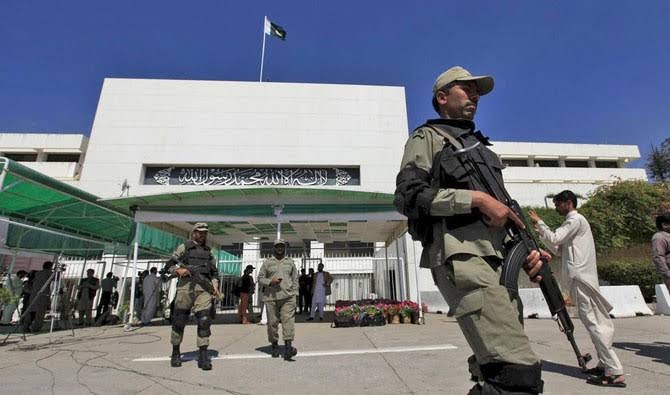Pakistan is neither hard nor soft
We need to shift our focus away from the bizarre sword fights between the hardness and softness warriors.
The “hardies” and the “softies” are battling it out ferociously. But there is something fundamentally wrong with this debate: Should Pakistan be a hard state or a soft state.
States are not hard nor soft. They are what they are: Geography containing people and a global identity registered with the UN. To ascribe values of hardness or softness to them is to use scales that are best deployed in school labs to study materials and their conditions. In the realm of political science, states are either functional or dysfunctional—and in between a range of other levels of functionality. What makes them functional (or otherwise) is a set of policies governments pursue to run the affairs.
So when the army chief says that Pakistan needs to become a hard state, the argument has to be set right: governance and security systems of Pakistan need urgent repair. This desperate situation has made the state of Pakistan putty in the hands of forces of terrorism and other mafias who break the rule of law (the grease that keeps state wheels running smoothly) and are attempting to break apart federation.
On surface there is nothing wrong with the reasoning that “the state’s power” must be used to deal with the enemies within. However, this begs the question whether the pursuit of “hardness” is creating a situation where Pakistan can be made more functional in protecting its citizens and achieving the goals of national development.
This is where the arguers for “softness” legitimately raise their hand and insist that coercion, unbridled use of raw kinetic and brutal legal power is aggravating Pakistan’s functionality.
Unfortunately, they, too, miss the point. What is the soft way to fight a war? How do you softly handle waves of suicide bombers, ethnic cleansers, or those whose declared agenda is to dismantle the state’s borders as these exist? Unless you are an anarchist whose goal is to destroy organized state structures, or a classical Marxist theoretician who believes the state of be a tool of oppression and wants it to wither away, no thinking citizen would ask for “softness” in dealing with forces that threaten to choke normal life in the boundaries that define the state.
This means that we need to shift our focus away from the bizarre sword fights between the hardness and softness warriors. We have to set up a more realistic agenda that “governmentablishment”—pardon the queer blend even though even more queer is the way it operates—ought to pursue to address the challenge at hand. This agenda also requires the misguided “softies” to a get a grip on the reality of the situation that Pakistan is faced with.
Realistically, what is happening in Balochistan and the KP is NOT “political grievances” playing out in a bloody manner. This is not some misplaced anger bottled up for decades now expressing itself via guns and bombs. This is a full-fledged insurgency with multiple proxies, propaganda tools, media narratives and dozens of deliberate distractions to create a thick fog around the real goals of its funders. The insurgency is fully bankrolled and has a clear plan of callous actions. Anyone who does not understand this needs to take a cold shower, wake up and read recent history of developed democracies’ response to all such plans their enemies made against them. These were crushed with brute force.
However, to fight this war that is being imposed upon the country, the governmentablishment cannot walk alone on the path of resistance. They will have to find a way to craft national cohesion to make their response efficacious and controversy-free. Obviously, the maze of political interests makes it almost impossible to market even core national goals to all stake-holders. Everyone will want their pound of flesh to strike the bargain. Till then everyone would remain wedded to their positions. Deep are the divisions that run through the body-politic—all the chickens that Raheel and Bajwa hatched are now coming home to roost. But this consensus must be achieved. Just like consensus was achieved on the 26th amendment. Or services chiefs’ tenures extension. Or before that general Bajwa’s extension. Or very recently with the Taliban of Afghanistan. Give and take works. The list is endless.
The bottomline is that when governtablishments decide to create the middle ground, they generally do succeed. That has to be the approach to tackle the calamitous situation the state of Pakistan finds itself in today. Apologies for and appeasement of terrorists and their proxies will lead to disaster. Also, the pretension that governmentablishment can win this complex war with a divided house is delusional. The result of such self-assured hubris will be more trouble, nothing else. Thus the way forward is this: put all energies in creating consensus to fight the war.
What can be the possible elements of this consensus, this will be discussed in the next piece.





I don't disagree with your perspective. The context of this situation is vital to understanding its dynamics and the egregious blunders of the past are indeed rebounding; however at present the pure mechanics, planning, target selection, networking, and the vast regional territorial expanse that is used as a springboard to sustain these attacks (not to mention the intel that is available) makes it clear that this is a war with an undeniable external dimension.
I have to disagree with the notion that this is a fully 'funded' proxy conflict. This is the result of some key decisions that the Pakistan's brilliant security appartus has taken in the last few decades. From nurturing the Taliban to sidelining the Baloch people through horrible tactics. I say let the chickens come home to roost.